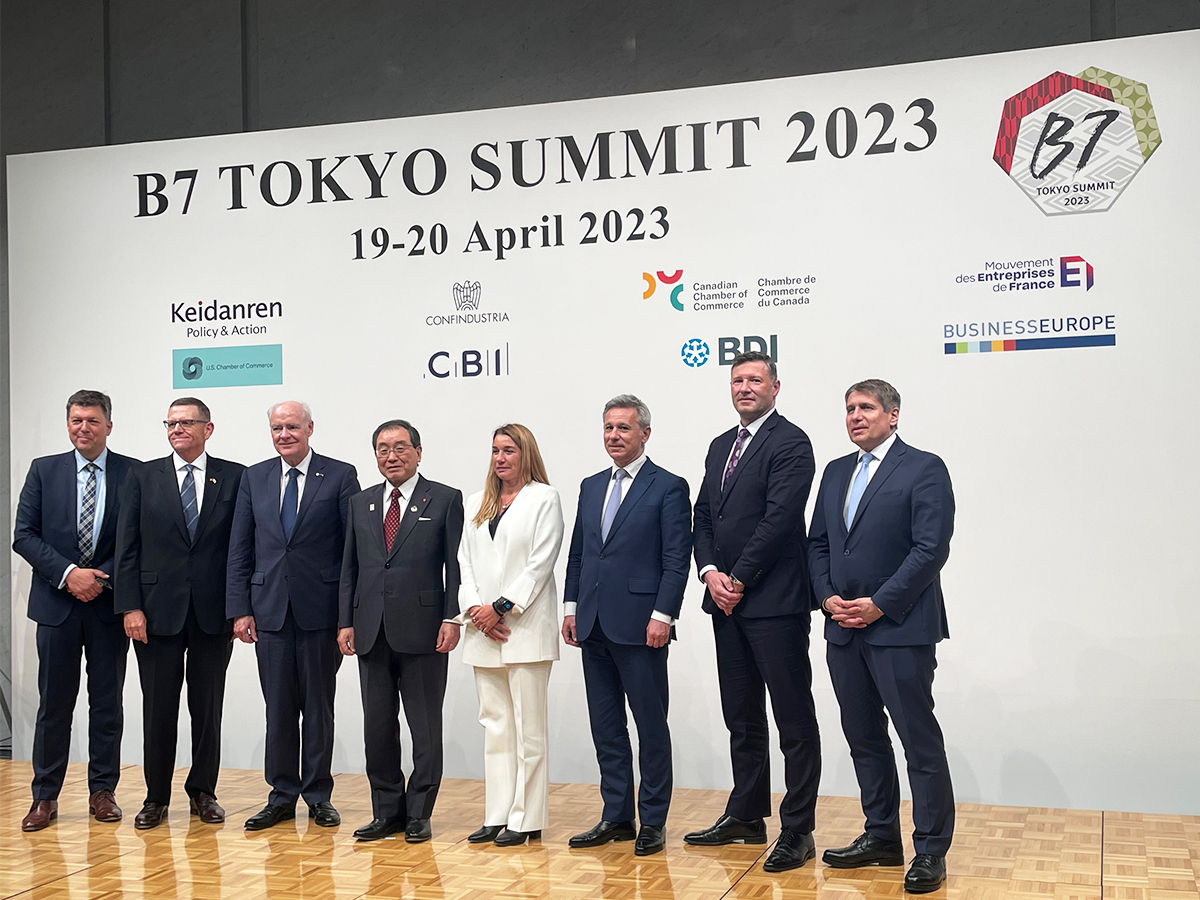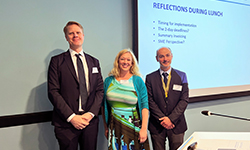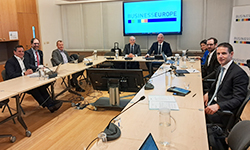BusinessEurope Headlines No. 2023-13
B7 Summit: more solidarity among G7 countries needed to face geopolitical tensions

Stronger alignment and cooperation among the G7 is necessary in view of increasing geopolitical tensions, but this should not imply less engagement with the rest of the world. “A free and fair Trade and Investment Club among G7 countries should also be open to others that adhere to the same principles and rules", said Markus J. Beyrer, BusinessEurope Director General at the B7 Summit in Tokyo on 19-20 April. He added that including other partners is key to avoid market fragmentation, ensure inclusiveness with the Global South and build more modern and robust multilateral rules. Another important area of cooperation and solidarity among the G7 is supply chain resilience. “De-risking and rebalancing dependencies in key areas like critical raw materials through increased cooperation will be essential to enhance security of supply”, Beyrer added. Read the joint statement.
![]() Contact: Luisa Santos, Elena Suárez
Contact: Luisa Santos, Elena Suárez
Free-trade agreements: the Spanish business perspective
Free-trade agreements are key for companies to grow, diversify markets, remain competitive, and achieve the green and digital transition. Watch two Spanish industry representatives share their views on this, as part of our video series on FTAs.
Innovation and intellectual property: key to reverse global productivity declines
 “In Europe, we are strong on research, and we are also strong on inventions, but it is not enough. We need to be stronger in the commercial deployment and bringing innovative technologies and products to the market,” said Alexandre Affre, BusinessEurope Deputy Director General, at the workshop “Exploring the Future of Innovation-driven Growth and the Role of Intellectual Property”, jointly organised by BusinessEurope and the World Intellectual Property Organisation (WIPO) on 5 April.
“In Europe, we are strong on research, and we are also strong on inventions, but it is not enough. We need to be stronger in the commercial deployment and bringing innovative technologies and products to the market,” said Alexandre Affre, BusinessEurope Deputy Director General, at the workshop “Exploring the Future of Innovation-driven Growth and the Role of Intellectual Property”, jointly organised by BusinessEurope and the World Intellectual Property Organisation (WIPO) on 5 April.
With the Global Innovation Index 2022 in mind, European industry and WIPO representatives discussed the central role of intellectual property in helping reverse the trend of global productivity declines and how to better translate innovation investments into tangible impacts.
Affre highlighted the importance of innovation to create competitiveness, growth, and ultimately to make sure that Europe leads globally in developing sustainable solutions. A solid and well-functioning intellectual property (IP) framework is needed in Europe. It is what best protects the fundamental intangible knowledge-based assets of companies and is essential to attract and reward investments.
Recent data show that the European Patent Office received 2.5% more patent applications in 2022 compared to 2021. This increase in patent filings was driven by China, the United States, and Republic of Korea, while patent applications from European companies and inventors remained stable overall.
One of the ingredients stressed by Affre to close this gap and make the business case for innovation is a more coordinated and strategic approach to IP, focusing on how IP policy can contribute to European industrial competitiveness. In addition, European businesses need to be more educated about IP and the importance of having an IP strategy. This workshop was an opportunity to raise awareness and promote the benefits that IP can offer to businesses in Europe.
Contact: Emelie Månsson, Elena Bertolotto
VAT in the digital age: implications for businesses and compliance processes
 The lack of common VAT (value added tax) compliance requirements has led to a highly fragmented and complex VAT system in the EU that is less resilient to fraud. Companies have to comply with an increasingly difficult tax compliance environment and a patchwork of obligations across the EU Member States. Technology-driven tools can be used to simplify the EU’s VAT system, maximising efficiency for all parties involved and allowing more time for tax administrations to focus on reducing the VAT gap. These were some key ideas discussed at BusinessEurope’s VAT in the Digital Age event held on 18 April. Speakers included Patrice Pillet from the European Commission, representatives from the Swedish Presidency and VAT practitioners of large and small & medium-sized enterprises.
The lack of common VAT (value added tax) compliance requirements has led to a highly fragmented and complex VAT system in the EU that is less resilient to fraud. Companies have to comply with an increasingly difficult tax compliance environment and a patchwork of obligations across the EU Member States. Technology-driven tools can be used to simplify the EU’s VAT system, maximising efficiency for all parties involved and allowing more time for tax administrations to focus on reducing the VAT gap. These were some key ideas discussed at BusinessEurope’s VAT in the Digital Age event held on 18 April. Speakers included Patrice Pillet from the European Commission, representatives from the Swedish Presidency and VAT practitioners of large and small & medium-sized enterprises.
![]() Contact: Mariella Caruana
Contact: Mariella Caruana
More competitive tax rules in the EU needed
 Competitiveness and simplicity should underpin the EU’s upcoming tax reforms to promote growth and long-term investment. As businesses are still grappling with the requirements of the Pillar Two Directive, the proposed BEFIT (Business in Europe: Framework for Income Taxation) will need to provide a simple, predictable and stable tax regime in order to succeed and obtain the support of the business community. This was the key message of members of BusinessEurope’s Tax Policy Working Group during an exchange of views with Bert Zuijdendorp, Head of Unit D1 at the European Commission Directorate-General for Taxation and Customs Union – DG TAXUD, on Monday 17 April. The group stressed that in order to avoid the introduction of additional complexities and tax compliance obligations, there needs to be a deep debate with all relevant stakeholders involved to find the best path forward, with a clear but realistic timeline as opposed to adopting hurried legislation that potentially ends up proposing another layer of tax compliance.
Competitiveness and simplicity should underpin the EU’s upcoming tax reforms to promote growth and long-term investment. As businesses are still grappling with the requirements of the Pillar Two Directive, the proposed BEFIT (Business in Europe: Framework for Income Taxation) will need to provide a simple, predictable and stable tax regime in order to succeed and obtain the support of the business community. This was the key message of members of BusinessEurope’s Tax Policy Working Group during an exchange of views with Bert Zuijdendorp, Head of Unit D1 at the European Commission Directorate-General for Taxation and Customs Union – DG TAXUD, on Monday 17 April. The group stressed that in order to avoid the introduction of additional complexities and tax compliance obligations, there needs to be a deep debate with all relevant stakeholders involved to find the best path forward, with a clear but realistic timeline as opposed to adopting hurried legislation that potentially ends up proposing another layer of tax compliance.
The Green Tax Working Group also exchanged views with Vicente Hurtado Roa, Head of Indirect Taxes other than VAT, Unit C2, DG TAXUD, on the proposed revisions of the Energy Tax Directive and, in particular, on component taxation and the tax treatment of hydrogen.
![]()
![]() Contact: Mariella Caruana
Contact: Mariella Caruana
Calendar 
- 6 June: Reuters Event: Responsible Business Europe 2023
- 14-15 June: International IP Enforcement Summit
- 19-20 June: TDI23 – Day of Industry
Not yet a subscriber? Register here.
Reminder: please have a look at our privacy policy